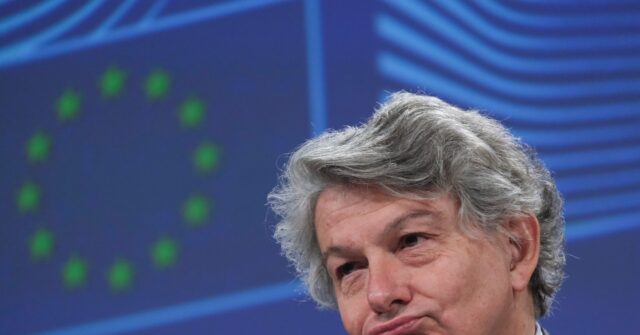

The European Commission announced on Tuesday a slew of social media platforms and other Big Tech websites that will come under stricter content moderation surrounding so-called hate speech and disinformation by the summer.
Under the European Union’s recently adopted Digital Services Act (DSA), which the bloc has described as providing “an unprecedented level of public oversight” on the internet, the European Commission will place at least 19 online platforms under its strictest level of censorship by August 25th.
Announcing the measure, European Commissioner for Internal Market Thierry Breton said: “With great scale comes great responsibility,” adding: “They will not be able to act as if they are too big to care.”
So far, the Commission has identified Alibaba AliExpress, Amazon Store, Apple AppStore, Bing, Booking.com, Facebook, Google Play, Google Maps, Google Search, Google Shopping, Instagram, LinkedIn, Pinterest, Snapchat, TikTok, Twitter, Wikipedia, YouTube, and Zalando as those in need of stricter ‘content moderation’.
The Digital Services Act specifies that websites or online platforms with at least 45 million users within the EU will come under more regulatory scrutiny, under the premise that they hold a special responsibility to police the internet and provide “safety” for their user base, with the legislation greatly expanding the ability of Brussels to police so-called ‘hate speech’ and ‘disinformation’.
Those that fail to comply with the censorship law by February of 2024 will face fines from the EU of up to six per cent of their global revenue as well as face a potential ban from Europe entirely.
With great scale comes great responsibility 🇺
Extra #DSA obligations as of 25 August for:
AliExpress
Amazon Store
AppStore
Bing
Booking
Google Maps
Google Play
Google Search
Google Shopping
Snapchat
TikTok
Wikipedia
YouTube
Zalando pic.twitter.com/CVmDuzkKe9— Thierry Breton (@ThierryBreton) April 25, 2023
The driving force behind the legislation, Thierry Breton, a former French tech executive, has previously warned new Twitter boss Elon Musk that the microblogging site could run the risk of being banned in the European Union should it restore the free speech roots of the company.
Although the bill claims to try to protect free speech, Breton himself has backed Big Tech taking censorship into their own hands, seemingly expressing support for Twitter’s decision to ban then-President Donald Trump in 2021, saying that tech companies “have recognised their responsibility, duty and means to prevent the spread of illegal viral content”.
The announcement on Tuesday is just the latest challenge facing Twitter since Elon Musk took over the platform. Earlier this month, prosecutors in Berlin announced that they have opened up legal action against the platform under Germany’s Network Enforcement Act (NetzDG) for failing to purge “illegal” content such as hate speech and insults. Should the case be successful the Silicon Valley giant could face a fine of up to €50 million.
While Twitter chief Elon Musk has expressed a desire to facilitate free speech on his platform, he has also said that Twitter will abide by local laws of governments around the world such as in the EU, where there are not robust First Ammendment-style protections for speech like in the United States.
Twitter could be banned from the EU if Elon Musk continues with his free speech reforms, a senior official within the bloc has reportedly said. https://t.co/M79DWZKc1f
— Breitbart News (@BreitbartNews) December 3, 2022
Follow Kurt Zindulka on Twitter here @KurtZindulka



